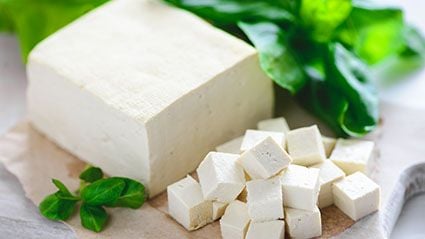
Women who’ve survived breast cancer may want to up their dietary intake of soy, nuts, beans and whole grains, a new analysis finds.
A higher intake of soy compounds called isoflavones was especially tied to better odds that cancer would not return, according to researchers at Johns Hopkins University in Baltimore and elsewhere.
The findings can’t yet determine the ideal dosages of isoflavones or other nutrients that appear to prevent recurrence, the authors said, so more research is needed in that area.
The study also can’t determine “whether starting to consume them after diagnosis has the same effect as a lifelong dietary habit before diagnosis,” senior study author Dr. Channing Paller said in a Hopkins news release. That’s information that “patients are looking for,” he said.
The review of data on nutrition and breast cancer recurrence was conducted by Paller’s group at Johns Hopkins Kimmel Cancer Center, along with researchers at other centers worldwide.
Investigators looked at data from 22 major studies that focused on soybeans, lignans (compounds found in a variety of plants such as seeds and nuts), cruciferous vegetables (crunchy veggies like cabbage, broccoli and cauliflower), and green tea.
They also looked at the effect of phytonutrients (compounds derived from plants) that are found in these foods.
Paller and her colleagues discovered that a high intake of soy isoflavones was linked to a 26% reduction in breast cancer recurrence.
The greatest benefit came from a daily intake of 60 milligrams — that’s equivalent to two or thee cups of soy milk, three ounces of tofu or a half-cup of cooked soybeans, the authors said.
The benefit of soy isoflavones in preventing breast cancer death was smaller, however — only about a 12% reduction. That benefit was highest when women ate about one or two servings of soy products per day.
For women who worry that eating soy might not be safe after a breast cancer diagnosis because soy isoflavones can act like estrogen in the body, the American Cancer Society offers this advice: “Some studies have suggested that soy food intake might lower the risk of breast cancer coming back, although more research is needed to confirm this. While eating soy foods doesn’t seem to pose a risk, the evidence regarding the effects of taking soy or isoflavone supplements, which often contain much higher levels of these compounds, is not as clear.”
Paller’s team also looked at lignans, found in a myriad of plants such as seeds, nuts, legumes, whole grains, fruit and vegetables. Flaxseeds, cashew nuts, broccoli and brussels sprouts contain especially high concentrations of lignans.
High levels of enterolactone — formed when lignans are broken down by the digestive system — appeared to reduce the odds for death from breast cancer by 28%, the study found, and to cut the odds for an early death from any cause by 31%.
The lignan and soy findings were solid enough to recommend that breast cancer survivors use them in any dietary guidelines.
Other findings didn’t have enough data behind them for that, but were “suggestive,” the researchers said.
For example, they found that drinking lots of green team was tied to a 44% reduction in breast cancer’s return for women who’d been treated for stage 1 or 2 breast cancers.
As to the influence of cruciferous vegetables on breast cancer outcomes, Paller and colleagues say the evidence simply isn’t there to draw any conclusions about possible benefit.
The findings were published recently in the journal JNCI Cancer Spectrum.
“It is critically important to stress that these studies were conducted on women who received medical and/or surgical treatment for breast cancer, and that these foods and phytonutrients should not be considered as alternatives to treatment,” stressed Paller, an associate professor of oncology at Johns Hopkins.
More information
Find out more about the role of diet on breast cancer outcomes at the American Cancer Society.
SOURCE: Johns Hopkins Medicine, news release, Jan. 10, 2024
Source: HealthDay

Leave a Reply